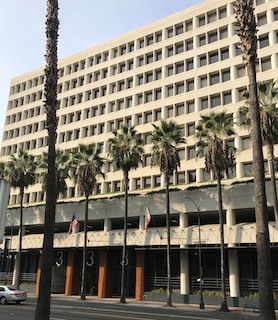As the reader of this article may already be aware, the Fourth Appellate District Court ruled in late 2021 in Nancy Grassi v. Superior Court of Orange County (2021) 73 Cal. App. 5th 283 that judicial diversion under Penal Code § 1001.95 is unavailable for DUI matters due to Vehicle Code § 23640, the categorical exclusion of DUI from diversion programs.
In both cases, the appellate courts acknowledged how close of a call it was and how mightily they struggled to ultimately rule as they did.
Now, the Sixth Appellate District seems to be following the Fourth and First Appellate Districts in Alicia Urbieta Islas v. Superior Court of Santa Clara County (2021 DJDAR 5143, filed May 20, 2021). However, in doing so, the Sixth Appellate District seems to have much greater ease in ruling as it did.
 Court of Appeal Sixth Appellate District San Jose
Court of Appeal Sixth Appellate District San Jose
Ms. Islas was charged in the Santa Clara County Superior Court with misdemeanor DUI several months before Penal Code § 1001.95 took effect in January 2021. After the new law came into effect, she requested that the trial court judge suspend proceedings and place her on pretrial judicial diversion under the new law (there is no dispute that the new law applies retroactively to nonfinal cases because it provides a potential ameliorative benefit to criminal defendants. In re Estrada (1965) 63 Cal. 2d 740).
As the reader of this article may understand, Penal Code § 1001.95(e) excludes eligibility for judicial diversion from those accused of violating any felony, as well as Penal Code § 273.5 (inflicting corporal injury on a domestic violence victim), Penal Code § 243(e) (battery on a domestic violence victim), Penal Code § 646.9 (stalking) and any offense for which a person would have to register under Penal Code § 290 (sex offender registration).
The trial court judge ruled that Ms. Islas was categorically ineligible under Vehicle Code § 23640(a), which provides: “[i]n any case in which a person is charged with a violation of Section 23152 or 23153, prior to acquittal or conviction, the court shall neither suspend nor stay the proceedings for the purpose of allowing the accused person to attend or participate, nor shall the court consider dismissal of or entertain a motion to dismiss the proceedings because the accused person attends or participates during that suspension, in any one or more education, training, or treatment programs, including, but not limited to, a driver improvement program, a treatment program for persons who are habitual users of alcohol or other alcoholism program, a program designed to offer alcohol services to problem drinkers, an alcohol or drug education program, or a treatment program for persons who are habitual users of drugs or other drug-related program.”
After the trial court denied her request for judicial diversion, Ms. Islas petitioned for a writ of mandate from the appellate division of the Santa Clara County Superior Court, which also denied relief.
Ms. Islas then filed a petition for a writ of mandate to the Sixth Appellate District in San Jose.
In trying to harmonize the two statutes, since Penal Code § 1001.95 does not mention Vehicle Code § 23640’s exclusionary provisions, the Sixth Appellate District decided that the exclusions to judicial diversion (273.5, 243(e), 646.9 and any 290 registrable offense) was not an exclusive list and nothing in 1001.95 indicated an affirmative intent to include DUI’s in judicial diversion.
The court further declined to acknowledge the Legislative floor statements of one assemblymember and one senator to the effect that the new law would include DUI because “we cannot rely on statements from individual legislators as reflections of the Legislature’s collective intent.” Tan, supra, at 141, citing Graham v. DaimlerChrysler Corp. (2004) 34 Cal.4th 553, 572, fn. 5.
The Sixth Appellate District also acknowledged that “while generally later enacted statutes prevail over earlier enacted statutes, in this case application of that principal conflicts with the command that we are to construe statutes together where possible and avoid implied repeals of existing law.” Tan, at 143.
The appellate court then smugly commented that the Legislative Counsel’s digest statements (acknowledging DUI was eligible for judicial diversion) and the signing statement from the Governor (also acknowledging that DUI was not excluded) “are not germane to our review because the plain language of the two statutes, considered together, is unambiguous.”
We think this case goes too far in disregarding the other materials addressed and hope that the issue will make its way to the California Supreme Court soon.
The citation for the Sixth Appellate District Court ruling discussed above is Alicia Urbieta Islas v. Superior Court of Santa Clara County (6th App. Dist., 2022) 78 Cal. App. 5th 1104, 294 Cal. Rptr. 3d 294.
For more information about judicial diversion for DUI, please click on the following articles:
 Court of Appeal Sixth Appellate District San Jose
Court of Appeal Sixth Appellate District San Jose